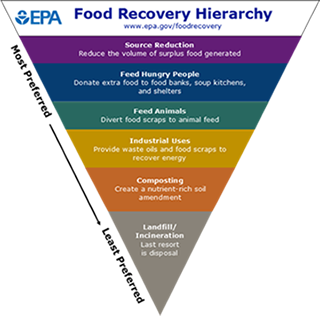Business Requirements and Resources
The mandatory organics recycling law defines a business as a commercial or public entity (such as a school or hospital) including multifamily residential dwellings (5 units or more), that generates a specified amount of organic waste after April 2016 (see Implementation Dates and Thresholds for detailed phase-in information).
A business is a commercial or public entity, including, but not limited to, a firm, partnership, proprietorship, joint stock company, corporation, or association that is organized as a for-profit or nonprofit entity or a multifamily residential dwelling.
A business that meets the 2 cubic yard waste generation (recycling + organics recycling + disposal) threshold shall engage in one of the following organic recycling activities:
- Source separate organic waste from other waste and participate in a waste recycling service that includes collection and recycling of organic waste.
- Recycle its organic waste on-site or self-haul its organic waste off-site for recycling.
- Subscribe to an organic waste recycling service that may include mixed waste processing that specifically recycles organic waste.
Helpful Tools
-
- Updated FAQs
- Search for City/County Recycling Contact
 Note: A business generating organic waste shall arrange for the recycling services in a manner that is consistent with state and local laws and requirements, including a local ordinance or local jurisdiction’s franchise agreement applicable to the collection, handling, or recycling of solid and organic waste.
Note: A business generating organic waste shall arrange for the recycling services in a manner that is consistent with state and local laws and requirements, including a local ordinance or local jurisdiction’s franchise agreement applicable to the collection, handling, or recycling of solid and organic waste.
If separate organic waste collection and recycling services are not offered through a local ordinance or local jurisdiction’s franchise agreement, a business generating organic waste may arrange for separate organic waste collection and recycling services until the local ordinance or local jurisdiction’s franchise agreement includes organic waste recycling services.
Additional points related to businesses:
- A business that is a property owner may require a lessee or tenant of that property to source separate their organic waste to aid in compliance.
- Additionally, all businesses that contract for gardening or landscaping services must stipulate that the contractor recycle the resulting gardening or landscaping waste.
- A multifamily complex is not required to arrange for recycling services for food waste.
- Businesses located in a rural county that is exempted from the law do not have to arrange for recycling services for their organic waste.
Related Resources
- A Guide to Workplace Composting provides information on composting at the workplace. Many businesses benefit from composting including office buildings, manufacturing facilities, hotels, event venues, hospital and medical facilities, grocery stores, and restaurants.
- A Guide to Segregating & Recycling Packinghouse Waste from Retail Stores PDF download – Collection, transportation, and recycling packinghouse waste, such as raw, unprocessed meat, poultry, and fish materials from commercial food facilities, is regulated by the California Department of Agriculture (CDFA). E-mail questions about how to handle and recycle raw meat, poultry, and fish scraps to rendering@cdfa.ca.gov.
- Business Assistance. CalRecycle has financial assistance programs for recycling manufacturers, such as the RMDZ loan program and GHG Reduction Grants and Loans.
- Greening Your Business. Don’t throw profits out with the trash! Green your business to save money and reduce greenhouse gas emissions with help from CalRecycle.
